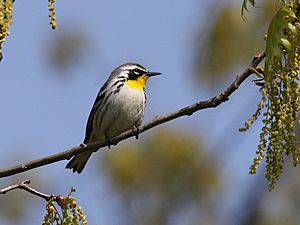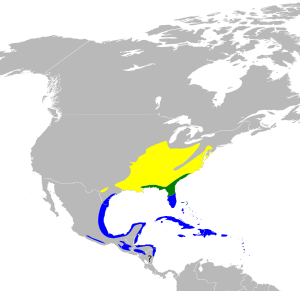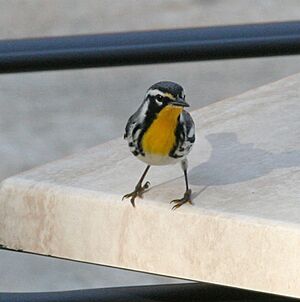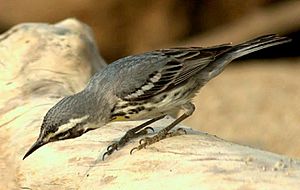Yellow-throated warbler facts for kids
Quick facts for kids Yellow-throated warbler |
|
|---|---|
 |
|
| Conservation status | |
| Scientific classification |
|
| Kingdom: | Animalia |
| Phylum: | Chordata |
| Class: | Aves |
| Order: | Passeriformes |
| Family: | Parulidae |
| Genus: | Setophaga |
| Species: |
S. dominica
|
| Binomial name | |
| Setophaga dominica (Linnaeus, 1766)
|
|
 |
|
| Range of S. dominica Breeding range Year-round range Wintering range | |
| Script error: The function "autoWithCaption" does not exist. | |
| Synonyms | |
|
|
Script error: No such module "Check for conflicting parameters".
The yellow-throated warbler (Setophaga dominica) is a small, colorful songbird. These birds travel long distances, meaning they are migratory. They breed in cooler areas of North America. This bird belongs to the New World warbler family, known as Parulidae.
Contents
What Does the Yellow-Throated Warbler Look Like?
Male yellow-throated warblers are easy to spot in summer. They have grey feathers on their backs and wings. Their wings also show two white stripes. Their throats are bright yellow, which gives them their name! The rest of their belly is white. They have black streaks on their sides.
Their heads have a strong black and white pattern. A long white or yellow stripe runs above their eye. This stripe is called a supercilium. Their flight feathers are black. These birds are about 14 centimeters (5.5 inches) long.
Differences Between Birds
Female, young, and non-breeding male warblers look a bit different. Their colors are not as bright. Their head patterns are less clear. They have lighter yellows and dark grey feathers instead of black ones. Even so, it can be hard to tell males and females apart.
Songs and Calls
Male yellow-throated warblers sing clear, whistling songs. Their songs go down in pitch. They also make high see sounds or sharp chip calls.
Measurements of the Warbler
- Length: 13-14 cm (5.1-5.5 in)
- Weight: 9-11 g (0.3-0.4 oz)
- Wingspan: 21 cm (8.3 in)
Where Do Yellow-Throated Warblers Live?

These birds make their nests in the southeastern parts of North America. Their breeding areas stretch from southern Pennsylvania to the Gulf of Mexico. One group of these warblers lives in northwest Florida all year.
Other groups of yellow-throated warblers are migratory. They spend their winters along the Gulf Coast. They also fly to eastern Central America and the Caribbean. Sometimes, they are seen in northern South America during winter.
Habitat and Diet
Yellow-throated warblers love woodlands. They especially like conifer trees or swampy areas. This is where they prefer to build their nests.
They mostly eat insects. However, outside of the breeding season, they also eat many berries and nectar. They usually pick food right off tree branches. Sometimes, they catch flying insects by briefly hovering in the air.
Nesting and Reproduction
These birds build nests that look like cups. They hide their nests in trees. They often place them among pine needles or in Spanish moss (Tillandsia usneoides). A female warbler usually lays 3 to 5 eggs, but most often 4.
Conservation Status
The yellow-throated warbler is not considered an threatened species. The IUCN says it is safe for now.
See also
 In Spanish: Reinita gorjiamarilla para niños
In Spanish: Reinita gorjiamarilla para niños



